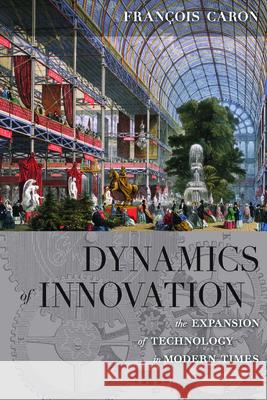Dynamics of Innovation: The Expansion of Technology in Modern Times » książka
Dynamics of Innovation: The Expansion of Technology in Modern Times
ISBN-13: 9781785330360 / Angielski / Miękka / 2015 / 272 str.
Dynamics of Innovation: The Expansion of Technology in Modern Times
ISBN-13: 9781785330360 / Angielski / Miękka / 2015 / 272 str.
(netto: 129,84 VAT: 5%)
Najniższa cena z 30 dni: 135,22
ok. 22 dni roboczych.
Darmowa dostawa!
..".offers a series of fascinating vignettes tied together by a satisfactory thesis about the commonalities associated with the evolving nature of technological innovation." - The Historian "To integrate the slow evolution of medieval know-how and the current explosion of information technologies into one analysis is a challenge magnificently met by the historian Francois Caron." - Gerard Moatti, Les Echos. Best known as the leading historian of French railways, Francois Caron has also conducted significant research on other aspects of economic development in the nineteenth and twentieth centuries, such as electricity, water and steam power, the theory of innovation, and the structure of enterprise. In this volume, he brings together different facets of his expertise to present a broad panorama of modern technological history. Caron shows how artisanal know-how was adapted, expanded, and formalized during the three industrial revolutions that swept over Great Britain, France, Germany, and the United States, resulting in a comprehensive analysis of this long, complex, and continuous historical process, leading up to the twenty-first century. He thereby illustrates the increasingly fruitful interaction between technological and scientific knowledge in modern times. Francois Caron is Professor Emeritus at the University of Paris IV, where he taught from 1976 to 1998. His many publications include An Economic History of Modern France (1979) and Histoire des chemins de fer en France (vol 1, 1997; vol 2, 2005). Allan Mitchell received his PhD from Harvard in 1961, then taught at Smith College (1961-1972) and the University of California, San Diego (1972-1992). His recent book is The Devil's Captain: Ernst Junger in Nazi Paris, 1941-1944 (Berghahn Books, 2011).
"...offers a series of fascinating vignettes tied together by a satisfactory thesis about the commonalities associated with the evolving nature of technological innovation." · The Historian"To integrate the slow evolution of medieval know-how and the current explosion of information technologies into one analysis is a challenge magnificently met by the historian François Caron." · Gerard Moatti, Les Echos.Best known as the leading historian of French railways, François Caron has also conducted significant research on other aspects of economic development in the nineteenth and twentieth centuries, such as electricity, water and steam power, the theory of innovation, and the structure of enterprise. In this volume, he brings together different facets of his expertise to present a broad panorama of modern technological history. Caron shows how artisanal know-how was adapted, expanded, and formalized during the three industrial revolutions that swept over Great Britain, France, Germany, and the United States, resulting in a comprehensive analysis of this long, complex, and continuous historical process, leading up to the twenty-first century. He thereby illustrates the increasingly fruitful interaction between technological and scientific knowledge in modern times.François Caron is Professor Emeritus at the University of Paris IV, where he taught from 1976 to 1998. His many publications include An Economic History of Modern France (1979) and Histoire des chemins de fer en France (vol 1, 1997; vol 2, 2005). Allan Mitchell received his PhD from Harvard in 1961, then taught at Smith College (1961-1972) and the University of California, San Diego (1972-1992). His recent book is The Devils Captain: Ernst Jünger in Nazi Paris, 1941-1944 (Berghahn Books, 2011).











